XINDE: Could you please share with us more about Schulte Marine Concept?
Schulte Marine Concept (S.M.C.) is
a market leading provider of tailored technical consultancy and project management services for newbuilding, conversion and retrofit projects. Our comprehensive range of services extends to technical support for fleet in service as well. We are headquartered in Shanghai, with regional offices in South Korea and in Hong Kong and project-specific site offices spread throughout global key ship building markets (today over 30 site offices in China, South Korea, Japan, Turkey, Portugal, Poland). S.M.C. is made up of over 200 multinational talents, including supervisors we deploy on-site to provide our clients the constant care for their projects.
S.M.C. is a member of the Schulte Group, which is an international, family-owned group of companies specializing in ship owner, ship management and maritime services. With over 135 years of expertise in the industry, the Schulte Group controls a modern and diversified fleet of over 90 fully or partly owned vessels. Bernhard Schulte Shipmanagement (BSM), part of the Schulte Group, manages more than 650 vessels.
Benefiting from being part of the Schulte Group, S.M.C. combines its own expertise in shipbuilding, BSM's experience in ship management and Bernhard Schulte's ship owning experience. S.M.C. brings these strengths to the management of newbuilding projects, ensuring that the vessels delivered are not only safe and reliable, but also meet the highest standards in the industry, making them highly competitive and attractive in terms of performance and value retention.
With a strong customer focus and good relationships with our shipyard partners, especially in China,
S.M.C. has delivered nearly 600 vessels around the world for our customers. Currently, we manage 152 other ongoing projects. Over the years, we have worked on over 30 types of vessels, ranging from container ships, bulk carriers, LNG vessels, LEG/LPG/NH3 carriers, crude/product/chemical tankers, passenger vessels to offshore vessels, and have partnered over 90 shipyards from China, Korea, Japan and Europe.
XINDE: S.M.C. is headquartered in Shanghai, does this mean that the Chinese market is the most important market for your company? How many ships have been delivered by SMC in China every year, and how about the situation in other markets, such as Korea/Japan/Europe?
S.M.C. entered the Chinese market in the 80's and since then we have witnessed amazing results in the continuous and steady progress of the Chinese shipbuilding industry in terms of ship capacity, performance and quality. For example, the design and delivery capability of new ships has increased significantly, and the remarkable increase in production efficiency has led to a significant reduction in shipbuilding cycle time, yet with good workmanship quality. It is also worth mentioning that the Chinese shipbuilding industry has made notable improvements in HSE management, which is very important.
In terms of our ongoing projects, the China market continues to be a key focus for us, making up more than half of the projects we supervise.
We have successfully executed projects at over 50 yards and delivered more than 300 vessels in China, with more than 100 more vessels in progress. In the past three year, S.M.C. delivered over 30 vessels in China each year, and these numbers are the testimony to the trust our clients place in us.
Moreover, Korea is another important market for us in terms of both number and type of vessels. Given the volume and profile of newbuilding projects we have in Korea, we have decided to open our Korean Regional Office to increase our efficiency to manage project there. Due to the nature and current condition of the shipbuilding industry in Korea, where very few small-scale shipbuilders remain active, our projects there are mostly about large LNG carriers, large container vessels. Having said that, we also run there stainless stee chemical tankers, MR tankers, LNG bunkering vessels, and feeders in small and mid-scale yards. As of today, we have 253 vessels in our Korean orderbook.
Interestingly,
after period of very low activity, our business has returned to the European shipbuilding market again. There we are mainly providing supervision services for newbuilding projects for small and medium-sized vessels, such as floating docks, coastal tankers, LNG bunkers, ferries and other special ship types. It is worth mentioning that the Turkish shipbuilding industry is growing dynamically, focusing on the production of small, high-value vessels, mainly for European clients.
XINDE: How many Chinese colleagues work with S.M.C.? The shipping and shipbuilding industries are both global and international, so there must be differences and demands between different cultures in daily management. How does S.M.C. balance this difference to make the business run smoothly?
We have a strong team of more than 120 Chinese colleagues, both in our Shanghai head office and in site offices, making up 60% of the S.M.C. workforce, and they are well-represented across all levels and genders. They work alongside colleagues from many nationalities, including project management, technical department and site supervision functions.
We strongly believe that this cultural diversity puts us in good stead to service not just Chinese clients, but also international ones who understand and value our multinational strength, global knowledge and local expertise.
We continue improving the gender diversity quotient and make the newbuilding supervision industry to be a choice for more female talent. I am glad that this diversity extends to us at S.M.C. We have a female commercial director, a female project manager in the technical team, female experts in the technical department, female dominated finance and administration departments, and, notably, an all-female human resources department. Female colleagues told me they are drawn to our kind of work and choose to make shipbuilding as their career, because they enjoy the opportunity to apply a logical approach to problem solving while exercising creativity in their engineering design skills. In fact, the shipbuilding industry is moving into an exciting future where such skills and expertise are going to be critical in helping shipowners meet decarbonization goals of 2030 and 2050. Therefore, I am hoping that more of the young engineering talent will join us as we meet this challenge.
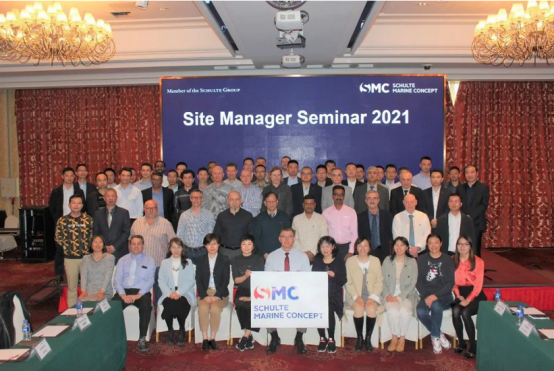 XINDE: What are the advantages of S.M.C compared to other companies in the same industry? For Chinese ship owners, why would they prefer S.M.C. instead of a local rival company?
XINDE: What are the advantages of S.M.C compared to other companies in the same industry? For Chinese ship owners, why would they prefer S.M.C. instead of a local rival company?
About how we keep things running in a professional, reliable, and smooth manner in the previous question, I would like to say that,
with all that diversity present in S.M.C., I would say that we are able to harness the strengths from robust management systems, tools and processes we have developed and implemented over the years of our work. We are able to recruit and retain thanks to our corporate culture, workstyle and focus and commitment to quality, safety and process digitalization. This not only guides the S.M.C.'s culture, but also underpins our commitment to deliver our clients with environmentally friendly, safe, durable and high-quality vessels. For many clients who are facing increasing pressure to balance vessel operational efficiency with environmental expectations, we aspire to be their reliable partner in their sustainability journey:
·Our quality management system is certified by Lloyd's Register for meeting ISO 9001:2015 standards and we have grade A supervision certificate from the China Association of Engineering Consultants.
·All staff are instilled with a strong Health, Safety, Security & Environment (HSSE) culture where they are supported with a robust set of guidelines and provided the necessary tools and information to carry out their work in a safe manner.
·We promote digitalization of our industry by managing business functions such as plan approval and site supervision through a web-based Enterprise Resource Planning (ERP) system called smartPAL that was developed in-house within the Schulte Group. Given the large scale of ship building projects, this single platform allows us to manage the projects in a real-time, transparent manner, and optimize our document control systems (drawings, reports, etc.). Along with increased digitalization of the business, we also actively promote cyber security awareness among our staff.
XINDE: In the past two years, COVID-19 has brought a huge impact to the shipping industry. There is a Chinese proverb that says "Opportunities always comes with Crisis". So, what kind of difficulties did S.M.C. encounter during this difficult period and how were solved? At the same time, what opportunities has S.M.C. seized and what is the outlook for the future?
Throughout the pandemic, supply chain disruptions actually drove demand for seaborne trade instead. Most of the shipyards in Asia made extreme efforts to continue working at full speed to keep up with newbuild and retrofit orders. This increasing demand in shipbuilding industry have been very welcome news and prove that the pandemic did not dampen ship building activity. In parallel, the maritime industry energy transition held steady pace. We can expect decarbonization to continue being driver for future ship types, technology, fuel and innovations as the industry gears up to meet IMO’s 2030 and 2050 emission targets.
We actively participate in this trend through various novel projects under development and execution, where both new technologies and new applications shape vessel's green profile. I would like to mention our participation in dynamically developing sector of offshore wind energy in China, where we are engaged in both Service Operations Vessels and Wind Turbine Installation Vessels newbuilding projects. Another area, where dynamics of green shipping trends are very visible are vessels with hybrid propulsion system. In certain sectors of shipping, batteries are becoming more and more efficient and well performing solution, so we are very proud to be a party participating in development and execution of newbuilding projects applying more and more sophisticated hybrid propulsion systems.
XINDE: Oil prices are soaring and the oil price differential is consequently widening, resulting in an increase in the installation of desulfurization towers/scrubbers. Meanwhile, the deadline of the new IMO regulation for Ballast Water Management System (BWMS) is approaching, could you offer some advice to Chinese shipowners?
With regard to Ballast Water Management System for ships, proven technology is available to meet the needs of every type and size of ship, so the shipping industry can proudly announce success in this field. It is difficult to imagine a deep-sea vessel being delivered from the shipyards without ballast water treatment plant.
For scrubbers, the industry is still facing the mountain of challenges related to the future fuels. Unfortunately, the mankind has neglected for many years importance of the emissions, and we are now trying to catch up all the delays in very short time and that is extremely difficult, if at all possible. The difficulty here is two dimensional: fuel and power generation technology. We have previously participated in many debates and seminars on ship fuels, and it is not easy to choose “the only one” fuel due to various factors such as economics, logistics, etc. Consequently, equipment makers face the situation, where they are expected to develop and offer power generation engines and boilers ready for all options of the alternative fuels currently considered, starting from natural gas, through ammonia, to methanol and hydrogen. It is quite a challenge for equipment manufacturers and difficult to achieve. we need to carefully review and understand the ship's power requirements, operating mode, trading routes, etc. Recent geopolitical developments have unexpectedly changed the pricing of the LNG reshaping, probably temporarily, which in turn has affected the picture of marine fuels market. Hence more and more conversations refer to the use of conventional fuel oils with supported by exhaust gas cleaning system. The installation and use of the mentioned exhaust gas cleaning system onboard the vessels is a proven technology, and we have experience in this area, both in newbuild installations and retrofit projects.
As a summary,
we should clearly and openly state that the is no way back from decarbonization. Despite all challenges and the pressures, large or small, all participants in the shipping industry need to continue their efforts. It also needs to be said, shipping is historically quite a conservative sector and needs injection of out of the box thinking from time to time, where we need to cooperate with shore and aviation industries. Finally, based on our own experience with development of novel designs, all projects must go through the exercise of regulatory and statutory compliance review, and in this new era, there is a greater need for innovation with the out-of-the-box thinking we just mentioned above.
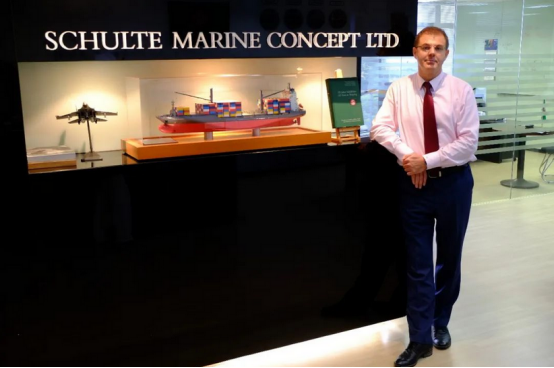 XINDE: You have been a member of Schulte Group for more than 20 years, and even more than 13years in S.M.C., in Shanghai, how do you feel about being part of Schulte Group?
XINDE: You have been a member of Schulte Group for more than 20 years, and even more than 13years in S.M.C., in Shanghai, how do you feel about being part of Schulte Group?
I really feel right at home.
The challenges and opportunities keep me motivated, and as the decarbonization and novel projects we just spoke about, there are not many companies that can offer you the opportunity to shape the industry and have your small part in changing the world for better.
I feel a strong connection with all of my colleagues across the whole Schulte Group, and that connection is very unique even beyond this industry. It is such a nice feeling seeing company growing steadily, seeing people working together, supporting each other and all marching in the same direction. Although there are times when we have “family issues”, we always find the “family solutions” serving the purpose and respecting others. This respect to people and social responsibility are quite special and always at the top of daily agenda, and it's what makes this place feel like "home".
XINDE: With almost 30 years of experience in the shipbuilding industry, can you tell us about the most memorable moment in your career?
There are many memorable moments related to the project,
but the most precious and unforgettable moments are the moments when I see the smiles on my colleagues' faces. And I can say that these smiles I see every day, and that is what keeps me going.
Coming from Germany, with a history of more than 100 years, S.M.C. entered China in the 80s, witnessed and participated in the development and growth of China's shipbuilding and shipping industry. The first impression of S.M.C. is pretty stable and reliable, and we believe that, such a great company can give more trust to the shipowners it serves. At the same time, we also see that this century-old company is inclusive, diversified and up-to-date with the times.
The opinions expressed herein are the author's and not necessarily those of The Xinde Marine News.
Please Contact Us at:
media@xindemarine.com

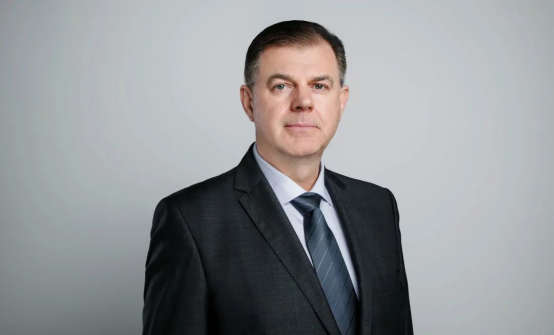


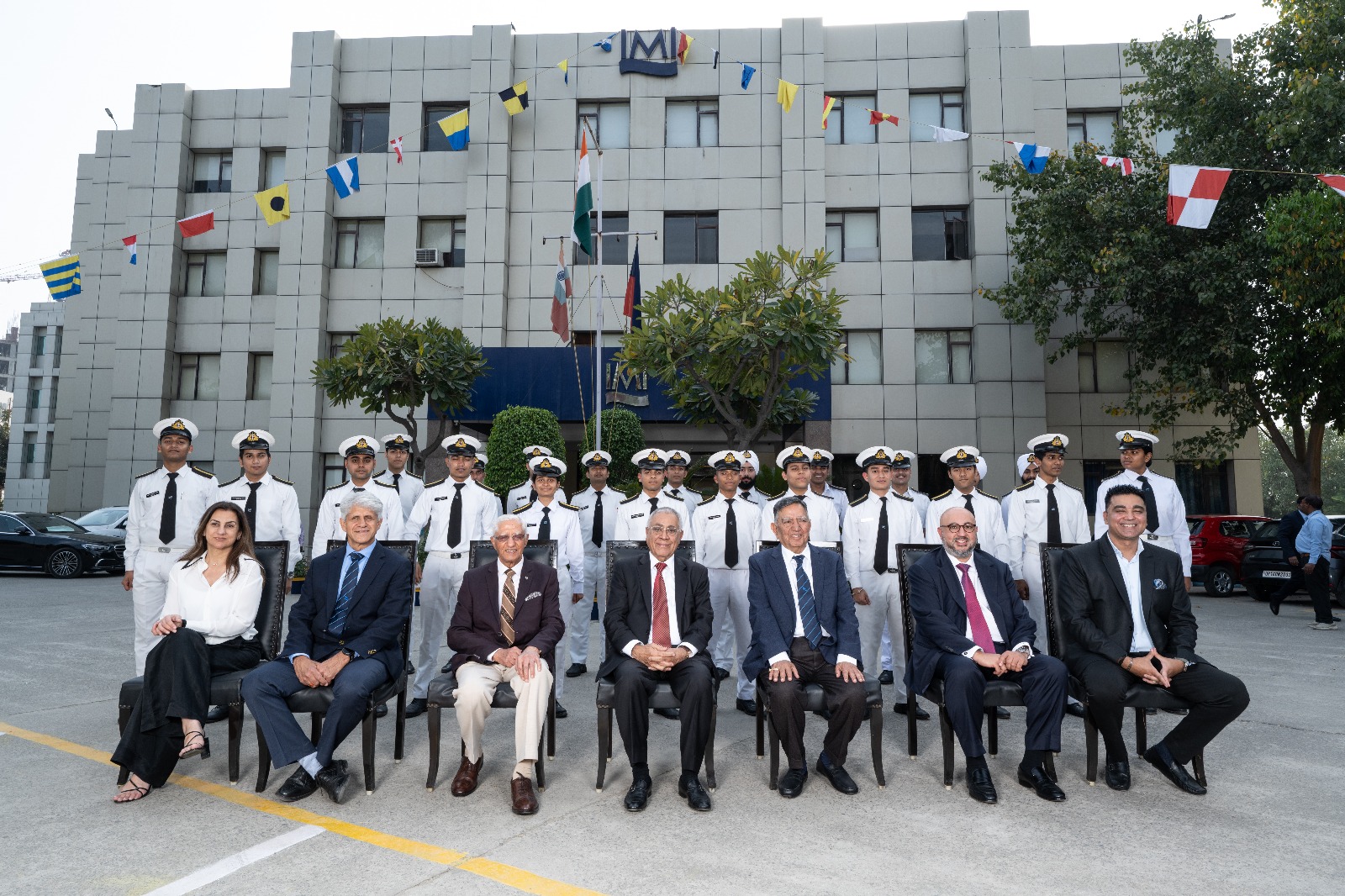 Dr. Harry S. Banga and Mr. Angad Banga of The Carav
Dr. Harry S. Banga and Mr. Angad Banga of The Carav 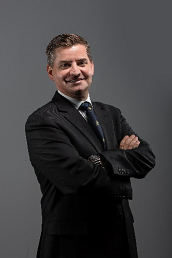 Liberian Registry Welcomes Kyle Hurst as Senior Vic
Liberian Registry Welcomes Kyle Hurst as Senior Vic  KATALIST: Accelerating Green Shipping through Innov
KATALIST: Accelerating Green Shipping through Innov  Revealing the risks: digital solutions for complian
Revealing the risks: digital solutions for complian 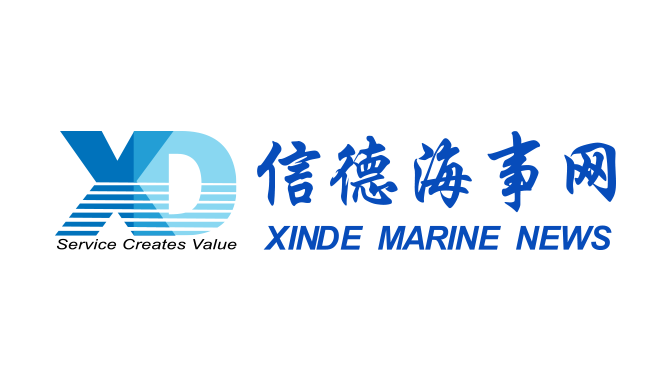 Beibu Gulf Port Chairman Zhou Shaobo Passes Away at
Beibu Gulf Port Chairman Zhou Shaobo Passes Away at 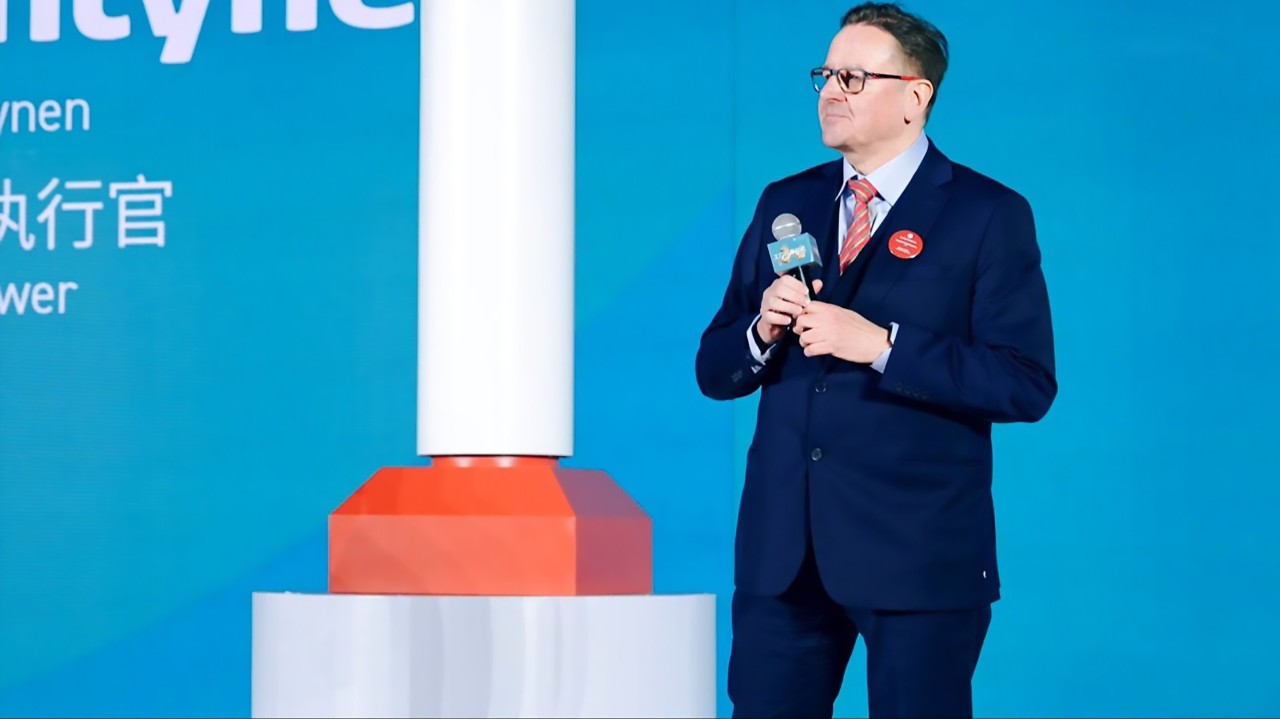 Exclusive Interview with Norsepower CEO: Bringing S
Exclusive Interview with Norsepower CEO: Bringing S